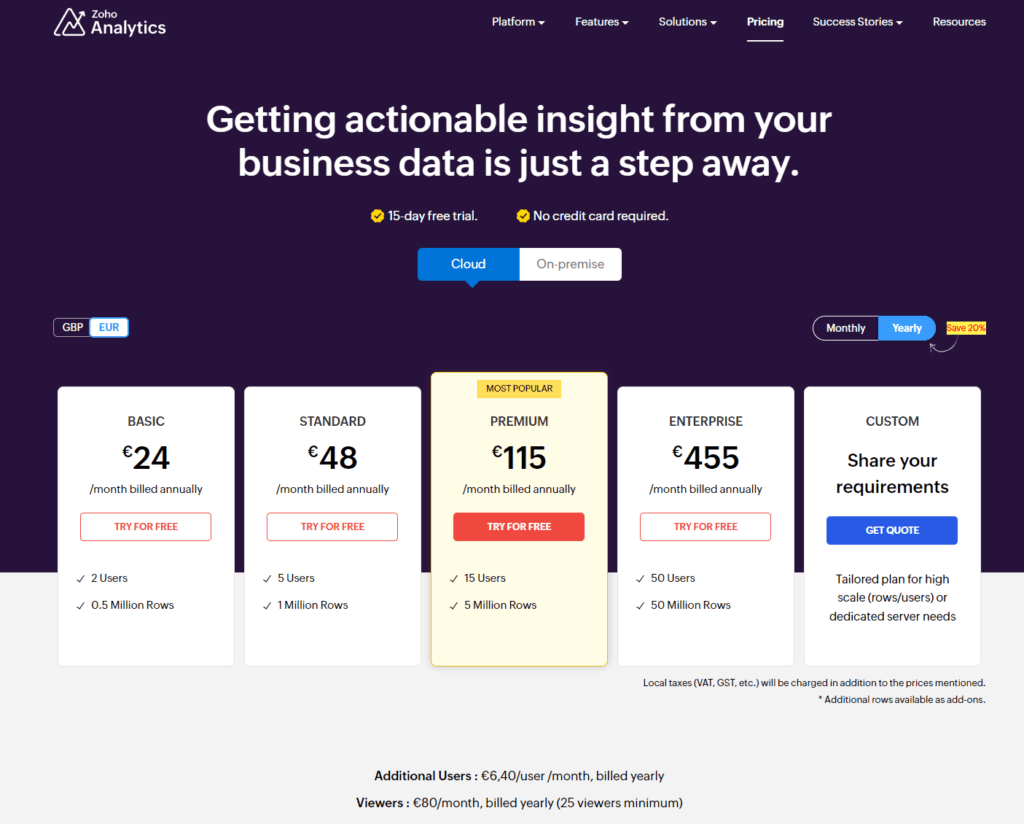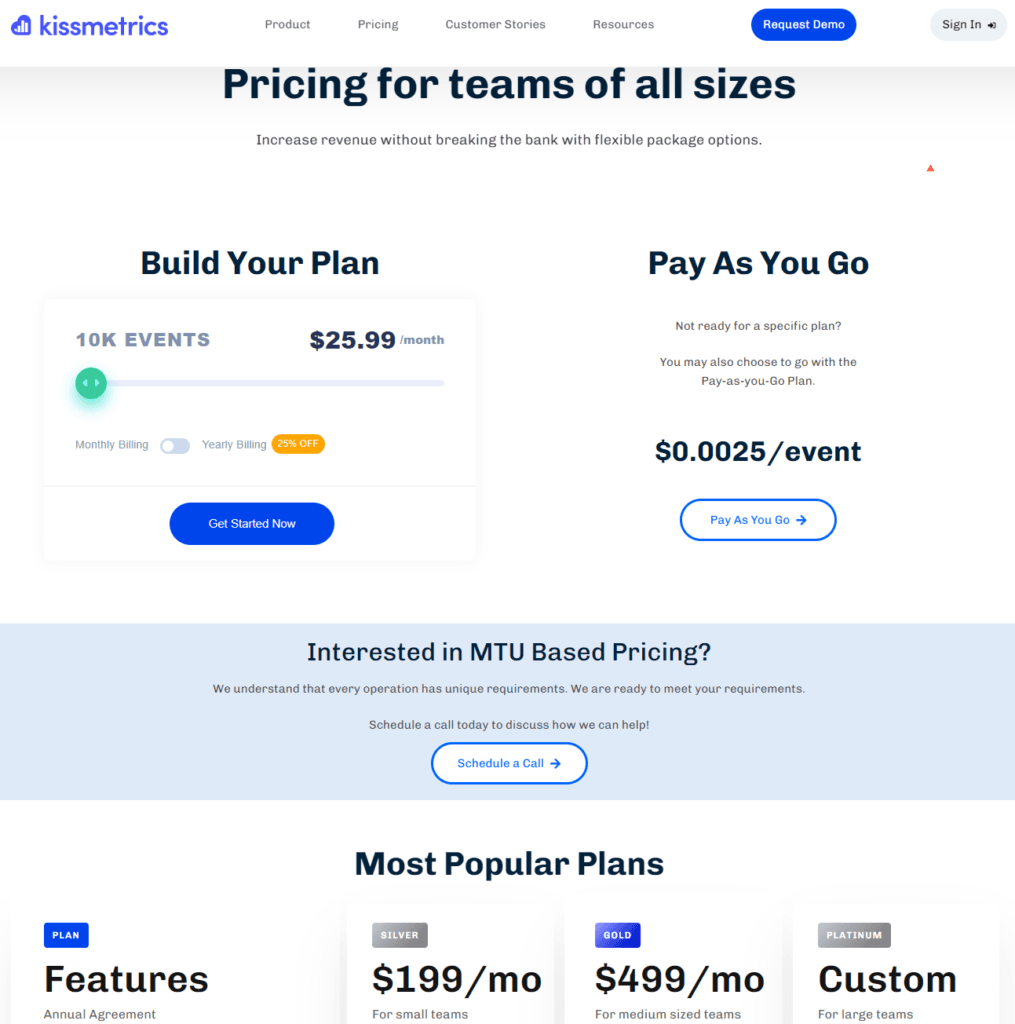In the bustling digital marketplace, where data is the currency of success, choosing the right analytics tool can feel like searching for the missing piece in an ever-expanding puzzle. Enter Zoho Analytics and Kissmetrics, two contenders vying for the chance to complete your picture. Zoho Analytics, with its broad suite of data integration and analysis tools, promises a panoramic view of your business landscape. Kissmetrics, focusing on customer behavior and conversion optimization, offers a laser-focused lens on what drives your users. But which tool will piece together the insights your business craves? Whether you’re navigating through vast oceans of data or zooming in on the user journey, this guide sets out to reveal “The Best Analytics Tool for You.”
| Zoho Analytics | Kissmetrics |
|---|---|
 |  |
| G2 Score -4.3 out of 5 | G2 Score -4.1 out of 5 |
| TrustRadius Score -8.1 out of 10 | TrustRadius Score -9.6 out of 10 |
Area of Comparison: Customer Behavior Analysis
In today’s data-driven environment, understanding customer behavior is crucial. How do Zoho Analytics and Kissmetrics stack up in offering insights into what makes your users tick?
Zoho Analytics: The Versatile Data Explorer
Zoho Analytics excels in providing a comprehensive platform that integrates data from various sources to offer a wide-angle view of your business operations, including customer behavior insights. Its strength lies in its versatility – whether you’re pulling data from CRM systems, marketing automation tools, or customer support platforms, Zoho Analytics can handle it all.
The platform allows for the creation of custom dashboards and reports that can shed light on customer acquisition, engagement, and retention metrics. Users can drill down into the data to identify trends and patterns, making it a powerful tool for businesses looking to understand customer behavior across multiple touchpoints.
Kissmetrics: The Customer Journey Specialist
Kissmetrics shines when it comes to detailed analysis of the customer journey. Designed specifically for e-commerce and SaaS businesses, it focuses on tracking individual user interactions over time, providing deep insights into how customers interact with your website or product.
Kissmetrics’ funnel and cohort reports are particularly valuable, allowing businesses to pinpoint where users drop off in the conversion process or how specific user groups behave over time. This level of detail extends to A/B testing outcomes, helping to optimize the user experience based on solid data.
Pricing: Zoho Analytics vs Kissmetrics
The pricing structure of an analytics platform can significantly impact its accessibility to businesses of various sizes and its overall value proposition. Here’s how you might frame the comparison between Zoho Analytics and Kissmetrics based on their pricing strategies.
Zoho Analytics: Flexible and Transparent Pricing

Zoho Analytics is known for its transparent and flexible pricing model, which is designed to cater to a wide range of business needs and sizes. It typically offers several tiers, starting from a free version with basic functionalities, which is great for small teams or individual users. As the tiers progress, the cost increases based on the number of users, data capacity, and the inclusion of advanced features.
This tiered approach allows businesses to select a plan that best fits their current needs, with the option to scale up as those needs grow. Zoho Analytics’ clear pricing structure ensures businesses can plan their expenses without worrying about unexpected costs, making it a budget-friendly option for small to medium-sized businesses and enterprises alike.
Kissmetrics: Custom Pricing Tailored to Specific Needs

Kissmetrics, focusing on customer behavior analytics and optimization, adopts a custom pricing model. The specifics of pricing depend on the scale of the business, the volume of data to be analyzed, and the range of features required. This tailored approach means that businesses need to contact Kissmetrics directly to get a quote, which can provide a pricing plan that precisely fits their analytics needs.
While this custom pricing approach can offer a lot of value by aligning costs directly with use and impact, it requires a bit more effort from businesses to understand potential expenses. It’s particularly suited for organizations that have specific requirements for analytics and optimization tools and are looking to invest in a solution that can offer deep insights into customer behavior.
User Interface and Accessibility
The design and ease of use of an analytics platform’s user interface (UI) significantly influence how effectively a business can harness its data. A well-designed UI enhances user engagement, reduces the learning curve, and makes complex data analysis more accessible to a broader audience. Here’s how you might frame the comparison between Zoho Analytics and Kissmetrics on these aspects.
Zoho Analytics: Intuitive Design for Diverse Users
Zoho Analytics is renowned for its intuitive and user-friendly interface, designed to accommodate users with varying levels of expertise. Its drag-and-drop functionality simplifies report and dashboard creation, making data visualization accessible to non-technical users. Zoho Analytics also offers a range of customizable templates and visualization options, allowing businesses to tailor their analytics experience to their specific needs.
The platform’s emphasis on collaboration and sharing, with features that enable users to easily share insights and make collective, data-driven decisions, further underscores its commitment to accessibility and user engagement.
Kissmetrics: Streamlined Focus on Key Metrics
Kissmetrics provides a streamlined and focused UI, particularly tailored to the needs of e-commerce and SaaS businesses. Its interface is optimized for quick access to key metrics that matter most for tracking and improving the digital customer journey. The platform simplifies the complexity of data analysis, offering pre-built reports and visualization tools that highlight user behavior and conversion trends.
While Kissmetrics may offer fewer customization options compared to Zoho Analytics, its targeted approach ensures that users can quickly derive actionable insights without navigating through unnecessary complexity.
Enhanced Integration Capabilities: The Next Frontier
Integration offers a valuable perspective when choosing between Zoho Analytics and Kissmetrics. Integration capabilities are crucial for ensuring that your analytics tool not only fits within your existing tech ecosystem but also enhances its capabilities.
Zoho Analytics: A Seamless Web of Data Connectivity
Zoho Analytics excels in creating a seamless web of data connectivity, offering robust integration capabilities across a wide spectrum of business applications and data sources. Its ability to effortlessly connect with numerous Zoho apps (such as Zoho CRM, Zoho Projects, and Zoho Books) and external services (including Google Analytics, Salesforce, and Slack) ensures that businesses can aggregate and analyze data from across their entire operational spectrum. This comprehensive integration facilitates a holistic view of the business, aiding in more informed decision-making and strategy development.
Furthermore, Zoho Analytics provides APIs that allow for custom integration, giving businesses the flexibility to tailor data connectivity according to their unique needs. This level of integration support ensures that Zoho Analytics can adapt to a business’s evolving data landscape, making it a future-proof choice for organizations looking to scale.
Kissmetrics: Targeted Integration for Marketing and E-commerce Excellence
Kissmetrics focuses its integration capabilities on marketing and e-commerce platforms, emphasizing depth over breadth. By offering deep integrations with tools specifically designed for digital marketing, e-commerce platforms, and product analytics, Kissmetrics ensures that businesses can closely monitor and optimize the customer journey. This targeted approach allows for detailed tracking of user behavior, from first contact through conversion and beyond, providing actionable insights that can directly impact marketing strategies and bottom-line results.
While Kissmetrics might offer fewer integrations compared to Zoho Analytics, its partnerships are meticulously chosen to enhance its core offering—delivering unparalleled insights into customer behavior and conversion optimization. For businesses in the digital space, this focused integration capability ensures that every tool and data source adds meaningful value to the analytics process.

Related: Check out our free SEO suite

Data Integration Capabilities
The ability to seamlessly integrate data from various sources is a cornerstone of effective analytics. Here’s how you might compare Zoho Analytics and Kissmetrics in terms of their data integration capabilities, expanding on the strengths and potential limitations of each.
Zoho Analytics: The Integration Powerhouse
Zoho Analytics stands out for its robust data integration capabilities, designed to pull together information from a diverse array of sources. It supports direct connections to numerous applications and platforms across CRM, marketing, finance, and sales, among others, facilitating a holistic view of business operations.
One of Zoho Analytics’ strengths is its flexibility in handling both cloud-based and on-premise data sources, making it a versatile choice for businesses with complex data ecosystems. Additionally, its ability to perform automatic data synchronization ensures that your dashboards and reports always reflect the most current data, providing real-time insights into business performance.
Kissmetrics: Focused E-commerce and SaaS Integrations
Kissmetrics, while offering a narrower scope in terms of data integration, focuses on deep integrations with e-commerce and SaaS platforms. It excels in capturing detailed user behavior data directly from your website or application, enriching these insights with data from connected e-commerce platforms, email marketing tools, and payment processing services.
This targeted approach allows Kissmetrics to provide highly relevant insights for businesses in the digital space, focusing on the metrics that matter most for customer journey optimization. However, companies looking for broader data integration across multiple domains may find Kissmetrics’ capabilities more limited compared to a tool like Zoho Analytics.
Customer Support and Community Engagement
The level and quality of customer support, along with an active, engaged community, can greatly enhance the value of an analytics tool. Here’s an approach to evaluating Zoho Analytics and Kissmetrics on these aspects.
Zoho Analytics: Comprehensive Support and Rich Community
Zoho Analytics offers a multi-tiered support system that includes email, live chat, and phone support, ensuring users can access help in the way that suits them best. Premium plans often come with additional support options, such as dedicated account managers and faster response times.
Zoho has fostered a large, active user community. Through forums, webinars, and user groups, Zoho Analytics users can connect with peers, share knowledge, and learn from others’ experiences. This vibrant community not only serves as a resource for troubleshooting but also as a forum for discovering best practices and innovative uses of the platform.
Kissmetrics: Focused Support for Optimization and Marketing Professionals
Kissmetrics provides targeted support designed to meet the needs of marketing and optimization professionals. While the platform may offer standard support channels like email and chat, it places a strong emphasis on ensuring that users can effectively leverage its features for detailed customer behavior analysis and optimization.
The Kissmetrics community, while more niche than Zoho’s, is highly engaged, particularly around topics of e-commerce, SaaS, and digital marketing. Resources such as detailed guides, case studies, and dedicated customer success stories cater to the specific interests of Kissmetrics users, facilitating a deep dive into optimization strategies.
Conclusion
In this journey through the capabilities and offerings of Zoho Analytics and Kissmetrics, we’ve dissected key components that make an analytics tool valuable to a business. From the granular, behavior-focused insights of Kissmetrics to the broad, integrative approach of Zoho Analytics, each platform has its unique strengths tailored to specific business needs.
Regardless of the tool you choose, the key to leveraging analytics effectively lies in clearly defining your objectives, understanding your data, and fostering a culture of data-driven decision-making within your organization. Whether you opt for Zoho Analytics or Kissmetrics, the goal is to harness the power of data analytics to uncover insights that drive strategic decisions, optimize operations, and enhance customer experiences, steering your business towards sustained growth and success in a competitive landscape.
READ NEXT:
- Delivra vs ReachMail: The Best Email Marketing Tool for You
- Delivra vs MailUp: The Best Email Marketing Tool for You
- Bitrix24 vs Vtiger: The Best CRM Tool for You
- 11 Marketing Analytics Tools to Elevate Your Data-Driven Strategies
- 29+ Digital Analytics Software to Skyrocket Your Digital ROI
- Segment vs Zoho Analytics: The Best Analytics Tool for You
- Zoho Analytics vs Looker: The Best Analytics Tool for You





















